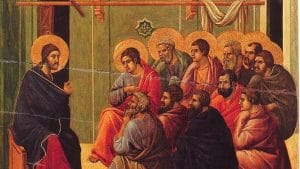In a 1946 Radio Address, Pope Pius XII said that “perhaps the greatest sin in the world today is that men have begun to lose the sense of sin.” There has been no great moral awakening since he uttered those words so that what was begun has found its completion in our age. The widespread loss of a sense of sin has led to a great spiritual malaise in which any semblance of shame has been lost and sins are demanded as rights. The soul of our culture is dead, which is not surprising because its natural soul, the members of the Church, have also lost their sense of sin. Communion lines grow longer while Confession lines grow shorter and even public sinners are given Communion as a right.
A Great Spiritual Awakening
Pope St. John Paul II thought that the only way to stimulate a Great Awakening was to restore this sense of sin:
“The restoration of a proper sense of sin is the first way of facing the grave spiritual crisis looming over man today. But the sense of sin can only be restored through a clear reminder of the unchangeable principles of reason and faith which the moral teaching of the church has always upheld. There are good grounds for hoping that a healthy sense of sin will once again flourish, especially in the Christian world and in the Church. This will be aided by sound catechetics, illuminated by the biblical theology of the covenant, by an attentive listening and trustful openness to the magisterium of the church, which; never ceases to enlighten consciences, and by an ever more careful practice of the Sacrament of Penance.”
Reconciliation and Penance, 18
The Holy Father was reminding the Church that one of her essential tasks in to preach the bad news of sin. In fact, the Church has no mission if there is no sin, or at least if there is no sin to be forgiven. Just as the Father sent the Son into the world for the forgiveness of sins, so the Son sends the Apostles and their successors (c.f. John 20:21-23). To omit the reality of sin from the Gospel renders the Good News utterly senseless.

The Pontiff did not just say that a sense of sin was necessary, but a healthy sense of sin. Sin and guilt, at least according to spirit of the world, are things to be explained away because it is unhealthy. That we can develop a healthy sense of sin is itself Good News because it frees us from not only rationalization but also scrupulosity. Both of these ensnare us because they leave us closed to the reality of God’s mercy. What then would a healthy sense of sin consist in?
Elements of a Healthy Sense of Sin
We must first see sin for what it really is. First and foremost it is an offense against God, but not God as Divine Rulemaker, but God as Father. In fact, JPII says that all sin is ultimately a rejection of God’s fatherhood. God gave to us the gift of freedom, but not so that we choose whatever we want, but so that we can choose Him. He is at every moment providing (e.g. Providence) the means for us to do that. We only need to orient our freedom towards this reality. Sin then is disorientation, setting our eyes off in the wrong direction and away from God. And this is why one of St. Thomas’ thought that “God is offended by us only because we act contrary to our own good” (SCG, 3.122).
A healthy sense of sin then begins by orienting our freedom with acts that are truly good. When we see sin as ultimately harmful to us and enslaving us, we lose the desire to rationalize and self-forgive. Now we desire to flush our sin and move forward in freedom.
But it also consists in seeing sin through the lens of God’s Providence. God only permits our sin if He can turn it to our good. The obvious example is the “happy fault’ of Adam that won for us the Redeemer. But this principle applies to each and every sin that we commit. Ultimately, we are permitted to commit certain sins and not others because those certain sins ultimately can be oriented by God towards our sanctification.
This sense of sin is unfathomable unless we drop the God strictly as Rulemaker paradigm. He is not sitting in Heaven with His Divine Gotcha Button waiting for us to mess up. From all eternity He plotted how He was to redeem me and you and that would include using those sins we commit as a means to that sanctification. This is not to trivialize our sin, but to see them from God’s perspective. We are permitted to commit certain actual sins because those are the sins that, when repented of, will draw down upon us the grace of a true and deeper conversion. So that when we sin, the grace of repentance follows right behind it, causing us to run back harder and faster than when we fell. This healthy sense of sin then takes the focus off of our actions and shines it upon Divine Mercy. In other words, a healthy sense of sin sees all personal sin as a means that Providence uses to glorify God’s Mercy and save our souls. Only a healthy sense of sin rooted in this reality protects us from falling into scrupulosity.



